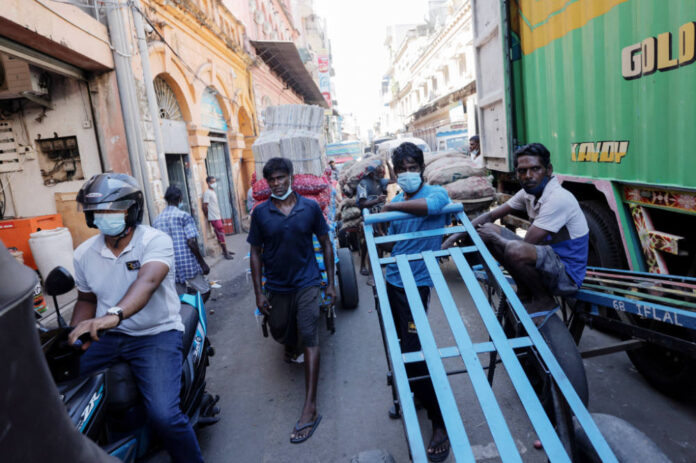COLOMBO: Sri Lanka’s prime minister warned on Friday of looming food shortages, with the country unable to secure fertilizer for rice cultivation amid a devastating economic crisis.
The island nation of 22 million people is facing acute shortages not only of food, but also medicines and fuel, as its budget deficit climbs to $6.8 billion, or 13 percent of gross domestic product, leaving essential imports out of reach.
Denial of food security in the country cannot be taken by the common man, and it can lead to a severe uprising.
Dayan Jayatillake, Former ambassador
Many in Sri Lanka can hardly afford three meals a day, with the price of some essential food items, such as rice, having risen by 300 percent since the beginning of the year, according to the central bank’s estimates from April.
The country has already defaulted on its debts after missing a deadline for foreign debt repayments on Wednesday. The following day, it ran out of petrol, with no money coming and fuel ships remaining anchored offshore.
A man celebrates as a truck carrying domestic cooking gas cylinders arrives for distribution in Colombo on Friday amid Sri Lanka’s economic crisis. (Reuters)
Prime Minister Ranil Wickremesinghe, who took office after his predecessor resigned last week, said the looming food crisis was due to a lack of fertilizer for agricultural production.
“From August there is the possibility of a food crisis in Sri Lanka,” he said in a statement, adding that it remains to be seen how the county will survive.
“As Sri Lanka has not had fertilizer for cultivation, the coming rice cultivation season will not have the full production.”
A decision in April last year by President Gotabaya Rajapaksa to ban all chemical fertilizer has led to a fall in crop yields. Although the ban was lifted a few months later, no substantial imports have taken place.
The situation is compounded by the war in Ukraine, a leading global exporter of grain.
“The shortage of food in the country is likely not only because of the local production but also due to the scarcity of imports, which were affected by the Ukrainian war,” Prof. Palitha Weerakkody, from the Department of Crop Science of the University of Peradeniya, told Arab News.
“Rice is the staple food here and there will be around 30 percent reduction in its harvest in July since the farmers have not got their imported inputs to boost their cultivation.”
Dayan Jayatillake, Sri Lanka’s former envoy to the UN in Geneva, said the anticipated food crisis will be the “greatest tragedy in the annals of Sri Lanka.”
Jayatillake told Arab News: “The ban on chemical fertilizers has jeopardized not only the paddy cultivation but also our tea plantation, which is our cash crop. Our dollar income from the export of tea is also dwindling.”
He said: “Denial of food security in the country cannot be taken by the common man, and it can lead to a severe uprising.”
Sri Lanka’s devastating economic crisis — the worst since independence in 1948 — has triggered widespread demonstrations across the country since March, with protesters demanding the resignation of Rajapaksa and his family, whom they blame for the worsening situation.
Mahinda Rajapaksa, the president’s elder brother, quit as prime minister on May 9, after clashes between government supporters and protesters left nine people dead and almost 300 injured.

